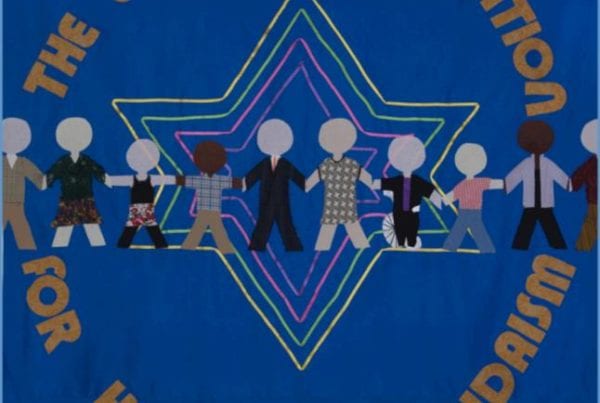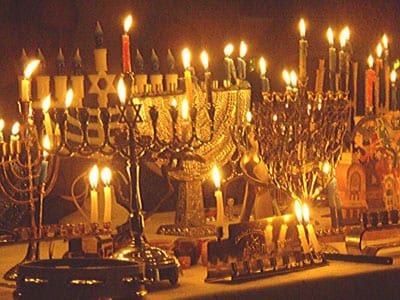THE HERMENEUTICS OF SUSPICION: SEEKING OUT A HEALTHY SKEPTICISM
Daniel Radosh
Rosh Hashanah 2008
I am a skeptic from a family of skeptics. Parents, grandparents, aunts, uncles — you name it, someone was skeptical of it: The government, the newspapers. The military, the hippies. Fascism, capitalism, Communism, television.
And, consistently, religion. True, my mother’s mother used to remind everyone there were five generations of rabbis in our family, but it wasn’t a point of pride so much as an opportunity for guilt trips. “You come from five generations of rabbis, and this is how you keep your room?”
In any event, the relatives that I knew had left God behind in Russia, Poland and Germany. Some of you will remember my great aunt Ann who attended several holiday services at the City Congregation before she died at age 96. Though she was quite fond of this group, she remained skeptical even of our secular practice. “It’s too religious,” she’d say. Ann was a skeptic to the end. In her final years, her closest companion was a young woman named Donna, who we’d hired as a caretaker and who had become a great friend. But on Ann’s last day of life, when she fell into a sleep from which she could not be awakened, the only person with her was a visiting nurse who did not know her well. When Donna, my wife Gina and I arrived at Ann’s house, the nurse, trying to comfort us, told us that Ann’s last words had been, “It’s OK. I’m going to be with God now.”
“She said that?” asked Donna, skeptically.
And then a few minutes later, to everyone’s amazement, Ann opened her eyes. Looking around at the four of us hovering over her she said, “Is this what you call my death bed?”
As we all expressed our joy and astonishment at her return, even though we knew it would only be temporary, the visiting nurse exclaimed, “You must have made a deal with God.”
Ann laughed her off. “I only make deals with Donna,” she said.
To say I am a skeptic from a family of skeptics suggests a certain lack of skepticism on my part. Have I really questioned and probed the way my parents and grandparents did, or have I simply accepted without question the suspicions they passed on to me? In April of this year, I published my first book, a non-fiction account of my travels in the world of evangelical Christian popular culture. For more than a year, I engaged deeply with people who were not skeptics but believers. It is impossible to spend so much time with people of such deep faith and not ask, why do I lack faith? Or, perhaps, what do I have faith in?
In many ways, the unwavering belief that I encountered was not only alien to me, but unappealing as well. Not just belief in a personal, loving God, but in the ability of believers to divine God’s intentions. Pro wrestler Rob Adonis absolutely assured me that God came to him one night and told him to start Ultimate Christian Wrestling. When I asked why God would want his own pro wrestling franchise, Adonis said that when he died and went to heaven that would be the first question he’d ask.
But I also saw expressions of faith that could not be so easily laughed off. I heard about the couple whose roof was blown off in a storm. The next day, their entire church arrived to build them a new one… In another town, a pastor’s wife was buying groceries when she overheard the cashier say she could only afford a candy bar for lunch. Without hesitation, she gave the girl a ten dollar bill. These small acts, and many larger ones as well, are undertaken not out of a sense of duty but in a spirit of joy. For these Christians, faith is not just what they believe but how they live.
So I wondered: How far would I go to help a stranger? My suspicion of religious commandments may free me from obligations, but does it make it harder for me to be a good person?
Aaron Weiss is a singer in a Christian rock band called mewithoutYou. He is what some people call a red-letter Christian. The core of his belief is the words that Jesus himself spoke, the ones often printed in the Bible in red letters. You would be surprised how many Christians seem to think these sections are highlighted so you know which parts to skip.
“Do not store up for yourselves treasures on earth.”
“Sell your possessions and give to the poor.”
“Whatever you do for the hungry, the sick, the oppressed, you do also for me.”
Talking to Aaron, I realized that his faith has not made him less skeptical, but more so. He questions the supposed truisms of modern life that most of us cling to quite blindly: The notion that happiness and self-fulfillment are ideals to aspire to. That comfort and satisfaction are the proper rewards of hard work. Aaron is a pacifist and environmentalist, and devoted to fighting poverty and injustice. These are not merely causes for him but expressions of the very meaning of human existence. He lives this way not because he has decided intellectually that it is right, but because he has faith.
Most evangelicals don’t share Aaron’s politics, though there are more out there than you’ve been led to believe. But what is not uncommon is his commitment to living consciously, with a consistent focus on right and wrong, and a determination to not simply coast through life doing whatever seems easiest or most useful at the time. I am not by any means saying that only Christians can live this way, but I do think you need to believe in something.
So I began to think seriously about what I believe in. In a way, merely saying “I believe in something,” was itself a challenge to the accepted order of things. After all, I was spending time with Christians for whom it was second nature to refer to other people as “non-believers.” They meant it descriptively, without any malice, and indeed there are many people who proudly call themselves “non-believers.” But I would no longer allow it. When someone referred to me as a non-believer, I would point out that I am a believer, I just happen to believe in something different.
Another label I no longer wanted to accept was atheist. It’s true that I don’t believe in God, but it’s also not particularly important. To say I am an atheist is to imply that rejecting God is central to my worldview, to define myself by what I don’t believe. By one of many things I don’t believe.
Of course there is one label I was already comfortable with. I am a Humanistic Jew. Believe me, you don’t know the meaning of blank look until you’ve said that to an evangelical Christian. What, after all, is a Humanistic Jew? In our services we say a Jew is someone who identifies with the history, culture and future of the Jewish people. That’s straightforward enough, and suitable for starting endless fights with other Jews. But what we don’t attempt is a definition of humanist. And that, I think, is what we are really trying to do with these questions about skepticism. Certainly, skepticism is a necessary condition for humanism. As long as we live in what Carl Sagan called a demon-haunted world, perceiving the truth—a precondition for any viable philosophy—will require not just suspicion but systematic rational inquiry.
But if skepticism is a necessary condition for humanism, it is not a sufficient one. To commit ourselves to the pursuit of human dignity and the integrity of every individual, we must seek opportunities to embrace hopes that can not necessarily be verified. In our Shabbat services we say, “the intelligence of a single person casts away the shadows of ignorance.” Personally, I wouldn’t want to be the one to have to demonstrate that scientifically. But nor would I want to strike it from our liturgy out of fealty to skepticism. As philosopher Antonio Gramsci said, the pessimism of the intellect must be tempered by the optimism of the will.
In his introduction, Rabbi Peter asked, if all truths are relative, is there any solid ground to stand on? But humanism does not reject moral authority so much as redistribute it. We are judged not by a supernatural being who stands outside of humanity, but by humanity itself. Elizabeth Anderson, a philosophy professor at the University of Michigan, describes “a system of reciprocal claim making… in which everyone is accountable to everyone else.” From our ever evolving society, there arise naturally, Anderson says, “rules for living together peacefully and cooperatively, on a basis of mutual accountability.”
My great aunt Ann knew this: “I only make deals with Donna.” And Jesus knew it as well: “Love your neighbor as yourself.” As did Rabbi Hillel: “What is hateful to you, do not do to your fellow man.” If this is the foundation of ethics, clearly neither skepticism nor faith is a prerequisite. What is more essential perhaps, is humility — a willingness to pause every now and then and say that as important as moral imperatives are, none of us has the right to force those imperatives on other people. We can be firm in our beliefs, while knowing that they can be spread only by persuasion not by imposition. Humility is what allows us to recognize the moral authority of other people, to know who our neighbors are and what it means to love them.
And humility is precisely one of those qualities that exists beyond skepticism. To be humble is not irrational, but it is rarely motivated by rationality. Skepticism allows us to say that other people’s ideas are wrong. Humility obliges us to consider that other people’s ideas may be right, perhaps in some way that we can not fully understand. Or, if they are clearly not, that they may still have some value. And more basically, that they deserve respectful engagement rather than glib dismissal.
Let us embrace rationalism and critical inquiry. Let others find their own path. But let us all tread lightly, with more concern for our own faults than those of others. The skeptic in us may scoff. But our inner optimist can remember that sometimes, skepticism has its limits.



